Susanna Madora Salter (1860-1961) and the small town of Argonia, Kansas, both made history when the town elected her mayor on 4 April 1887. She holds the distinction of being the first woman elected to a political office in American history. The significance of this achievement is not lessened by the fact that her election began as a mischievous prank. Nor is her pioneering accomplishment diminished by the fact that she was not a supporter of the women’s liberation movement.
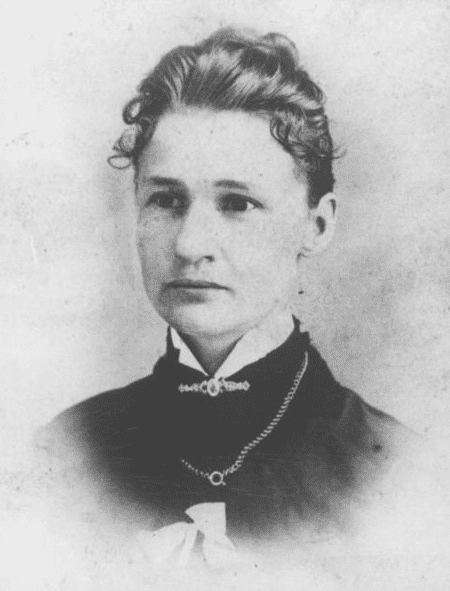
Her election aroused great interest in the nation’s newspapers, and stirred up a debate whether a woman could successfully hold a political position. Her one-year term as mayor was watched closely, and although uneventful, all agreed it had been a success. Salter, having no political ambitions whatsoever, declined to seek re-election, devoting herself instead to the care of her family. However, the precedent had been set, and her example showed America that women could indeed handle the responsibilities of political office.
While women’s suffrage and women’s liberation were not her concerns, there was an issue Salter cared about passionately: prohibition – and this interest led to her being elected, albeit in an indirect and unintended way. She was a member of the local Woman’s Christian Temperance Union (WCTU). In 1887 Kansas granted women living in first, second and third-class cities the right to vote. Argonia (with nearly 500 residents) qualified as a third-class city, and so the women in the local WCTU determined to use their votes to support the state prohibition law.
To spite these women and sabotage their efforts, some local men who enjoyed their liquor decided to play a prank. They secretly printed up ballots that listed Susanna Salter as a candidate for mayor. They figured that only members of the WCTU would vote for a woman for mayor, and hoped that Salter’s lopsided loss would teach the women to mind their homes and stay out of political matters.
When election officials saw the ballots the morning of the election, they rushed to Salter’s house to see what was going on. She was greatly surprised to find out she was a candidate (her husband even more so!), but stated that she would serve as mayor if she won. A campaign sprang up to support her election, and the town responded: Salter won with a two-thirds majority, the men voting for her right along with the women.
History was made, and Salter served her one-year term with grace and dignity for the symbolic salary of $1. After that experience she never again sought political office, and lived to the ripe old age of 101, an unassuming, modest pioneer – but a pioneer nonetheless.
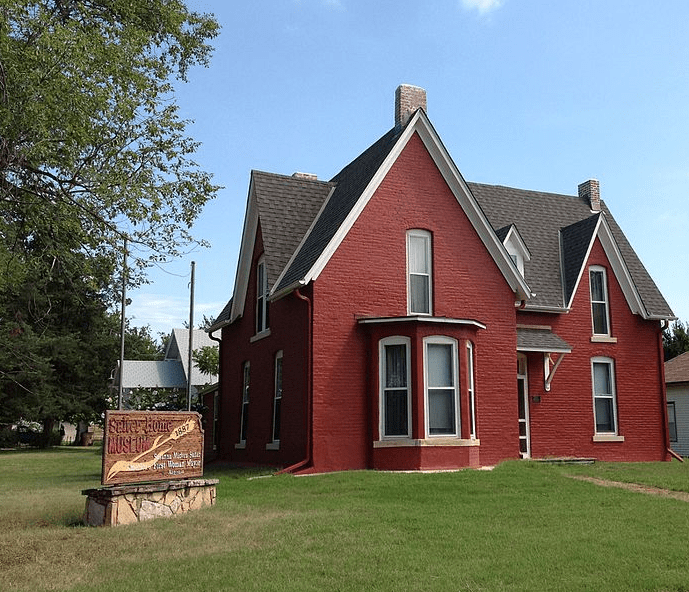
The following newspaper articles give an indication of the nationwide interest taken in Salter’s election. Most of them are brief notices written shortly after she was elected mayor, but the first article is a longer piece written by a correspondent sent to Argonia to see what all the fuss was about, several months after her election.
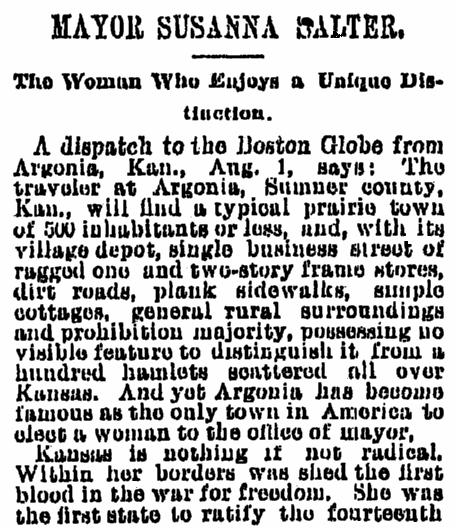
Here is a transcription of this article:
Mayor Susanna Salter
The Woman Who Enjoys a Unique Distinction
A dispatch to the Boston Globe from Argonia, Kan., Aug. 1, says:
The traveler at Argonia, Sumner county, Kan., will find a typical prairie town of 500 inhabitants or less, and, with its village depot, single business street of ragged one and two-story frame stores, dirt roads, plank sidewalks, simple cottages, general rural surroundings and prohibition majority, possessing no visible features to distinguish it from a hundred hamlets scattered all over Kansas. And yet Argonia has become famous as the only town in America to elect a woman to the office of mayor.
Kansas is nothing if not radical. Within her borders was shed the first blood in the war for freedom. She was the first state to ratify the Fourteenth Amendment. She was the leader in the fight for prohibition, and her latest distinction is being the first state in the Union to grant to the women of municipalities the right to vote on all matters referred to popular suffrage. This carried with it the right to hold municipal office, and so Mrs. Susanna Madora Salter was last spring elected mayor of Argonia, and is now endeavoring to perform the duties of that post.
Being in southwestern Kansas, and having heard something of Argonia’s chief magistrate, the Globe correspondent paid a visit to the little town and gained from personal observation some knowledge of the workings of this latest “Kansas idea.” An interview with the mayoress was easily secured, and as the visit fell upon the day of the city council’s monthly meeting an opportunity was given to see her in a position where she was clothed in all the dignity of her office. Mrs. Salter is an easy, confident and rapid talker, speaking to the point and usually in good English, though occasionally lapsing into what has sometimes been termed in Kansas “Governor’s English,” it having been the fault of the good St. John in conversation to frequently employ such forms of expression as “I have went,” “I have saw,” etc. Mrs. Salter is now 27 years of age, is rather the reverse of plump, weighing about 128 pounds, and is of a quick, active temperament. Her eyes are dark gray, and her hair, which she wears parted in the center and “crimped,” is of a blonde shade. She dresses neatly, but not expensively, making all her own clothes and also those of her children, of whom she has four. Her history, as narrated by herself, differs little materially up to the time of her election from that of thousands of her sisters throughout America.
“I am a home body,” Mrs. Salter said, “and I have only been to one convention, that of our county Woman’s Christian Temperance Union, of which order I am a member. I never neglect my home duties, and as I have never had a girl until since my election, you may easily understand that I have had no time, even if I had had an inclination, to run around attending state conventions and meetings.”
Mrs. Salter’s maiden name was Susanna Madora Kinsey, and she was born of Quaker parents on a farm near Lamira, Belmont county, Ohio, in 1860. In 1872 she removed with her parents to a farm twelve miles west of Topeka, Kan., and thus, with the exception of a few years at school away from home, she had spent her whole life on a farm until, with her husband, she removed to Argonia about four years ago. In 1878 and 1879 she attended the Kansas State Industrial College at Manhattan. Attending the college at the same time was the man she subsequently married, Louis A. Salter, the son of a lieutenant governor of Kansas. Every student at this college was required to choose an industrial study, and Miss Kinsey selected dressmaking, and it is her boast now that she never hired but one dress made in her life. In the beginning of 1880 Miss Kinsey’s health broke down from overwork, and though she would have graduated in a short time, and even had her graduating essay partly prepared, the death of a classmate from fever following overstudy warned her to seek a rest, and she never returned. In the fall of 1880 she was married to Mr. Salter, and in 1883 they and her father’s family removed to this section. The first mayor of the place was Oliver Kinsey, Mrs. Salter’s father. Houses were scarce and builders few, and the first winter Mr. and Mrs. Salter lived in a deserted grain house.
Their cooking was done on a gasoline stove and a portable heater, the stove pipe of which was run through a chute hole, furnished them warmth. When the wind would change it would be necessary to pick up the heater and carry it to the other side of the house to another chute hole. Her husband, who is now a well-to-do attorney and real estate agent, is a manly, whole-souled fellow, and occupies unchallenged the place of head of the family. In speaking of woman suffrage Mrs. Salter said she was not inclined toward it until it was so generally asked for and so heartily granted.
The history of Mrs. Salter’s election robs the situation of some of its romance. As in most small towns in Kansas, the question at issue in local politics is not a political one: It is the enforcement or non-enforcement of the prohibitory law. Considerable apathy being shown by the men of Argonia last spring, the W.C.T.U. finally called a caucus, to which all voters were invited. After speeches, a candidate for mayor and five councilmen were named, and the meeting adjourned. Early on Monday morning an anti-prohibitionist ordered some tickets printed with Mrs. Salter’s name for mayor. They were circulated as a burlesque, but when the members of the W.C.T.U. heard of it they concluded to hoist the burlesquer with his own petard, and went to work for her with such good effect that at night she was found to have fully three-fourths of all the votes cast.
In due time she qualified and began the discharge of her duties, which consisted in the first place of appointing a city clerk, treasurer, marshal, policeman, street commissioner and city attorney. Beyond these appointments she has only to preside at the council meetings and see that the few ordinances are duly observed, for which she receives the magnificent salary of $1 per annum. She would like to have sidewalks laid and some protection secured against fire, and she insists on the property owners keeping their premises in a good sanitary condition. Although the people of Argonia entertain hopes of one day becoming a county seat, the revenue of the city is so small at present that Mrs. Salter has been forced to be content with carrying out the laws at present on the city’s statute books; no exceedingly difficult matter it would seem, as but one arrest has been made under her administration, and that for a violation of the dog tax law.
At the meeting of the council there were four councilmen present. Mrs. Salter, wearing a street dress and a fashionable straw hat, presided with great decorum, and several times checked discussions which she deemed irrelevant, to the evident dislike of the aldermen, four young men, who, though respectful, bore the air of protesting pupils of a not over-popular school mistress. No official action was taken on any subject, though an order of business was carried out and several matters discussed. When the councilmen were asked if they knew of any violations of ordinances which demanded attention, and no response came, the mayor mentioned that she knew of two small boys having thrown stones through a vacant house, and she thought they should be arrested and punished. This was about all the business transacted, and it is little less than the council is ever asked to do.
The mayor continues to be regarded as something of a curiosity by even her townspeople, and as she passes by she is always pointed out to strangers. The mischievous small boy appears to regard her much as a New York gamin does a “cop,” and “There’s the mayor,” is often the signal for a general scatter of urchins as she approaches.
Mrs. Salter was asked if her ambition to act as a female politician or leader in woman suffrage circles had been aroused by her election. She quickly replied: “No, indeed. I shall be very glad when my office expires, and shall be only too happy to thereafter devote myself entirely, as I always have done heretofore, to the care of my family.”
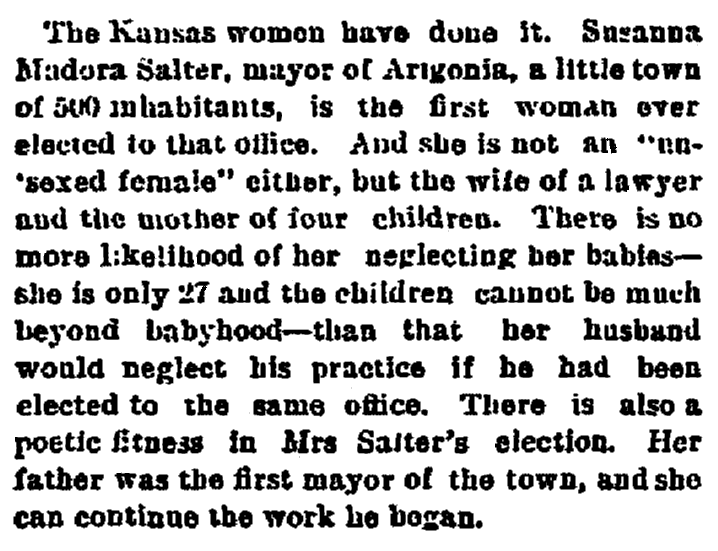
Here is a transcription of this article:
The Kansas women have done it. Susanna Madora Salter, mayor of Argonia, a little town of 500 inhabitants, is the first woman ever elected to that office. And she is not an “un-sexed female” either, but the wife of a lawyer and the mother of four children. There is no more likelihood of her neglecting her babies – she is only 27 and the children cannot be much beyond babyhood – than that her husband would neglect his practice if he had been elected to the same office. There is also a poetic fitness in Mrs. Salter’s election. Her father was the first mayor of the town, and she can continue the work he began.
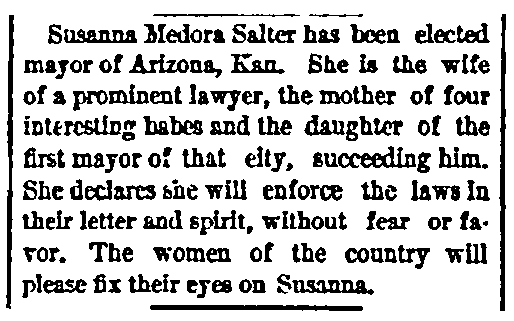
Here is a transcription of this article:
Susanna Madora Salter has been elected mayor of [Argonia], Kan. She is the wife of a prominent lawyer, the mother of four interesting babes and the daughter of the first mayor of that city, succeeding him. She declares she will enforce the laws in their letter and spirit, without fear or favor. The women of the country will please fix their eyes on Susanna.

Here is a transcription of this article:
Susanna Madora Salter is a striking illustration of the possibilities for women in Kansas. She is the wife of a successful lawyer, the mother of four lusty children, Mayor of the town of Argonia and only 27 years old.
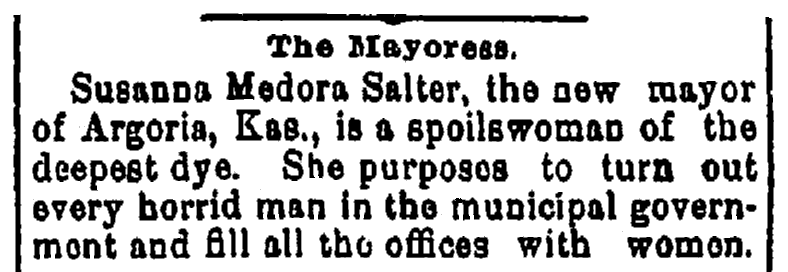
Here is a transcription of this article:
The Mayoress
Susanna Madora Salter, the new mayor of Argonia, Kas., is a spoilswoman of the deepest dye. She proposes to turn out every horrid man in the municipal government and fill all the offices with women.
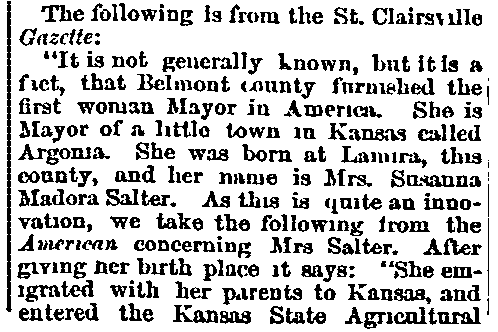
Here is a transcription of this article:
The following is from the St. Clairsville Gazette:
It is not generally known, but it is a fact, that Belmont county furnished the first woman Mayor in America. She is Mayor of a little town in Kansas called Argonia. She was born at Lamira, this county, and her name is Mrs. Susanna Madora Salter. As this is quite an innovation, we take the following from the American concerning Mrs. Salter. After giving her birth place it says: “She emigrated with her parents to Kansas, and entered the Kansas State Agricultural College as a second-year student at the age of 17; remained three years, and was compelled by failing health to leave two months before graduation. At 20 she married L. A. Salter, a graduate of the same college, and they soon removed to Argonia, where Mr. Salter is practicing law. Four children have been born to them, and Mrs. Salter, with all her other accomplishments, is a model mother, wife and practical housekeeper. Her father was the first Mayor of Argonia. Mrs. Salter was elected by a two-thirds majority – only one woman voting against her. At the age of 27 this educated, womanly woman is performing in person the duties of Mayor. She does not fear them in the least, and is determined, by the help of God, so to conduct her office as to make it serve the best interests of the city. She is much interested in the enforcement of the prohibitory law, and in the study of the best means of suppressing and eradicating the vice that beset our cities.”
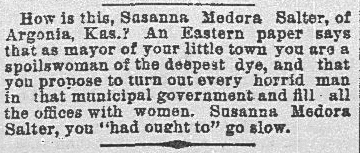
Here is a transcription of this article:
How is this, Susanna Madora Salter, of Argonia, Kas.? An Eastern paper says that as mayor of your little town you are a spoilswoman of the deepest dye, and that you propose to turn out every horrid man in that municipal government and fill all the offices with women. Susanna Madora Salter, you “had ought to” go slow.
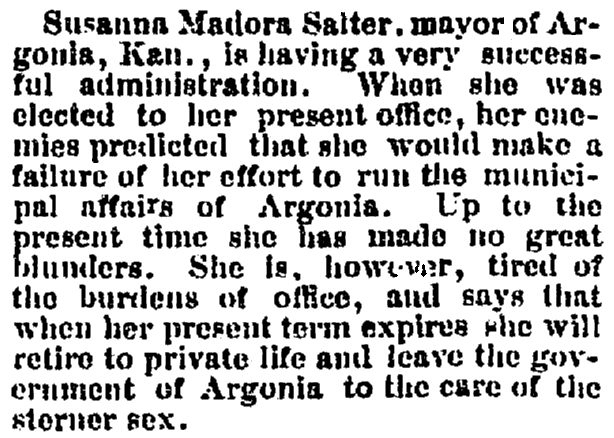
Here is a transcription of this article:
Susanna Madora Salter, mayor of Argonia, Kan., is having a very successful administration. When she was elected to her present office, her enemies predicted that she would make a failure of her effort to run the municipal affairs of Argonia. Up to the present time she has made no great blunders. She is, however, tired of the burdens of office, and says that when her present term expires she will retire to private life and leave the government of Argonia to the care of the sterner sex.
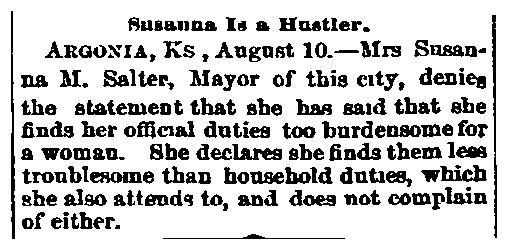
Here is a transcription of this article:
Susanna Is a Hustler
ARGONIA, KS, August 10 – Mrs. Susanna M. Salter, Mayor of this city, denies the statement that she has said that she finds her official duties too burdensome for a woman. She declares she finds them less troublesome than household duties, which she also attends to, and does not complain of either.
Note: An online collection of newspapers, such as GenealogyBank’s Historical Newspaper Archives, is not only a great way to learn about the lives of your ancestors – the old newspaper articles also help you understand American history and the times your ancestors lived in, and the news they talked about and read in their local papers.
Related Articles:
